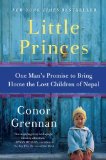Summary | Excerpt | Reading Guide | Reviews | Beyond the Book | Read-Alikes | Genres & Themes | Author Bio

One Man's Promise to Bring Home the Lost Children of Nepal
by Conor GrennanThis article relates to Little Princes
According to Next Generation Nepal's website, the 1996-2006 Nepalese civil war between government forces and the insurgent Communist Party of Nepal claimed 12,000 lives and devastated the economy; and, in remote areas of the country, the Maoist rebels used intimidation and even murder to control villages and abduct children into their army. Even though the conflict officially ended in 2006, child traffickers have continued to prey on rural villagers' concerns for their children by deceiving families with promises of safety for their children and attendance at top boarding schools in the Kathmandu Valley - but the sad reality is that the children who are taken from their homes are often kept as slaves or beggars, taken to illegal orphanages or, in some cases, are given counterfeit documents making them available for international adoption.
After his travels to Nepal and his extensive involvement with the Little Princes Children's Home in the village of Godawari, Conor returned to the United States and, with the partnership of his co-founder Farid Ait-Mansour, wife Elizabeth Grennan, and with the help of a board of directors, founded a non-profit organization called Next Generation Nepal (NGN). NGN is dedicated to reuniting trafficked children with their families by "searching remote regions to find families of children who were taken by child traffickers with false promises of safety and education," facilitating family visits and correspondence, and providing transitional homes in which children can feel protected and safe until reconnected with their parents.
With offices in both New York City and Kathmandu, the organization works to actualize its vision: A future Nepal free from the threat of child trafficking and strengthened by thriving agricultural communities populated by generations of children living together with their families in strong, safe communities that provide the care, education and life skills necessary for a productive life in rural Nepal. According to the organization's website, NGN has created an original, "three-step approach" to rejoining families: first, they physically seek out the families of the missing by hiking the mountainous landscapes to where they live. Then, the team connects the children and their families with letters, photos and visits; then "if conditions are deemed safe and appropriate," the two are put back together. While in NGN's care, children attend school, "participate in rural community life, visit regularly with family and learn the customs and traditions of their birth."
Next Generation Nepal has found the families of hundreds of trafficked children who are now reconnected through regular facilitated communication; and they have permanently reunited dozens of children with their families. That only about one in ten of the reconnected children have thus far been permanently reunited points to the complexity of NGN's work - for a better understanding of how this works in practice, view the video slideshow below and the other slideshows on NGN's website.
As reviewer Elizabeth K. informs us, "A portion of the proceeds from book purchases go to help the children of Nepal, and after reading this book you'll surely want to help. Kudos to Conor and to the work that Next Generation Nepal is doing to save children from harm and, when possible, to reunite them with their families."
For more information on how you can get involved, please visit:
NextGenerationNepal.org/Volunteer
For more about the plight of Nepalese children, in particular the estimated 12,000 Nepalese girls sold each year into sexual slavery, see the sidebar to our review of Sold by Patricia McCormick.
Filed under Places, Cultures & Identities
![]() This "beyond the book article" relates to Little Princes. It originally ran in February 2011 and has been updated for the
December 2011 paperback edition.
Go to magazine.
This "beyond the book article" relates to Little Princes. It originally ran in February 2011 and has been updated for the
December 2011 paperback edition.
Go to magazine.
At times, our own light goes out, and is rekindled by a spark from another person.
Click Here to find out who said this, as well as discovering other famous literary quotes!
Your guide toexceptional books
BookBrowse seeks out and recommends the best in contemporary fiction and nonfiction—books that not only engage and entertain but also deepen our understanding of ourselves and the world around us.